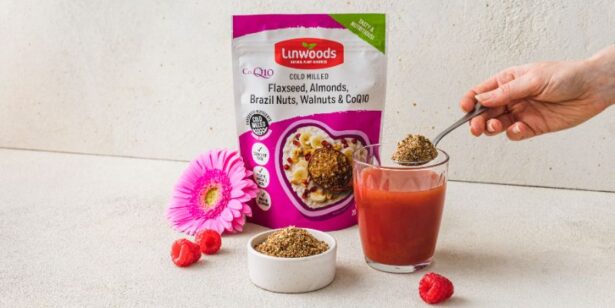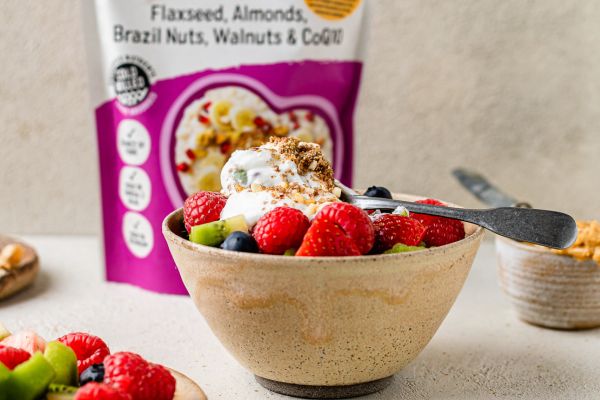Flaxseed for PMS Relief: 5 Ways To Say Goodbye to Monthly Discomfort
The idea of Flaxseed for PMS relief discussed by Registered Women’s Health Nutritional therapist & Nutrigenomics Practitioner, Cara Shaw. Here Cara delves into how we unravel the potential of flaxseed in alleviating discomfort of PMS.
For many women, the latter half of their monthly menstrual cycle can bring along a host of unwelcome symptoms collectively known as premenstrual syndrome (PMS).
UNVEILING THE POWER OF FLAXSEED: A NATURAL APPROACH TO ALLEVIATING MONTHLY DISCOMFORT OF PMS

PMS is a common disorder that affects almost 50% of women of reproductive age worldwide. It’s characterised by at least one physical, emotional, or behavioural symptom, that manifests in the latter half of the menstrual cycle (the luteal phase) and resolves shortly after the start of menstruation. Symptoms vary widely but include abdominal cramping, acne, breast tenderness, bloating, headaches, mood variability, depression, and anxiety. (1)

PMS has many possible underlying causes and contributing factors as to the severity of the symptoms – it will completely depend on the individual. However, it is evident that poor gastrointestinal health, unmanaged stress levels, excessive alcohol, and a diet high in refined sugars can all contribute to PMS severity. Whilst conventional approaches to PMS may offer medication, the natural approach involves making conscious dietary and lifestyle changes.
There is certainly no one-size-fits-all solution, but incorporating flaxseed into your diet may provide a natural and effective way to manage common PMS symptoms. In this blog, we’ll explore the various benefits of flaxseed for PMS, the components that make it a potential solution, its role in hormonal balance, and delicious ways to integrate it into your diet.
BENEFITS OF FLAXSEED FOR PMS RELIEF
SOURCE OF ESSENTIAL FATTY ACIDS

Flaxseed are an excellent source of the essential fatty acid, alpha-linolenic acid (ALA). This is a type of omega-3 fatty acid that our bodies simply cannot produce on their own, and therefore, it becomes essential to include in a diet.
Essential fatty acids play a crucial role in cellular health and reducing inflammation in the body. By improving cellular function, protecting cells from oxidative stress (aka damage), and inhibiting inflammatory mediators; they can help to modulate PMS symptoms, particularly those associated with discomfort and pain, such as abdominal cramping. (2)
DIGESTIVE & MICROBIOME SUPPORT
Flaxseeds are an excellent source of soluble and insoluble fibre which can serve directly and indirectly to support PMS.
Insoluble and soluble fibre in flaxseed can directly support common digestive symptoms of PMS such as constipation and bloating, by adding bulk to stools and increasing bowel motility, thus relieving abdominal pressure.
Flaxseed [4] can indirectly support PMS via the microbiome and its role in hormone detoxification and elimination. Oestrogen goes through a detoxification process in the liver where it becomes ready to be excreted. Once this happens, oestrogen enters the bowels. If gut bacteria are not optimal, enzymes can allow oestrogen to be re-absorbed into the circulation, playing havoc with the balance of sex hormones, and increasing the likelihood of PMS symptoms. Including flaxseed in the diet, can help to alleviate this problem, by re-establishing a healthy balance of bacteria within the gut microbiota, which in turn helps to support healthy oestrogen metabolism.
POSITIVE IMPACT ON CRAVINGS AND APPETITE
Flaxseed intake has been shown to improve carbohydrate metabolism and lower fasting glucose. During the latter half of a menstrual cycle, blood sugar levels naturally increase, so flaxseed intake can be a nice adjunct to help ease off some of side effects of blood sugar spikes e.g. increased cravings particularly for sweet foods. Additionally, the soluble fibre from the flaxseed helps to keep you fuller for longer, so can help to reduce increased appetite, commonly associated with the week before menstruation. (3)
NATURAL HORMONE MODULATOR
Flaxseeds are the richest source of lignans, a type of phytoestrogen. Phytoestrogens are a class of plant compounds that have a structure similar to the hormone oestrogen. These plant compounds contain gentle plant oestrogens that may help to restore balance if oestrogen levels are higher relative to progesterone. By gently helping to modulate oestrogen levels in the body, flaxseed may help to restore hormonal imbalances that can contribute to PMS symptoms.
MOOD REGULATION
Hormonal fluctuations during the menstrual cycle can contribute to mood swings, irritability, and other emotional symptoms. Omega-3 fatty acids have been shown to help regulate hormones and neurotransmitters, such as serotonin, which can positively impact mood and emotional well-being during the menstrual cycle. Flaxseed [5] consumption is a convenient way of getting in more omega-3 into your diet, especially if you don’t consume oily fish.
Flaxseed’s multifaceted nutritional profile makes it a great natural aid for helping to manage PMS symptoms. The combination of omega-3 fatty acids, fibre, lignans, and antioxidants creates a synergistic effect that addresses various aspects of PMS discomfort. Incorporating flaxseed into your diet offers a natural and holistic approach, targeting not only specific PMS symptoms but also overall well-being by supporting inflammation, gut health, and blood sugar balance.
DELICIOUS AND PRACTICAL WAYS TO INCORPORATE FLAXSEED INTO YOUR DIET
Adding flaxseed into your diet doesn’t need to be complicated. Let’s dive into how you can practically use flaxseed in your everyday routine to support the menstrual cycle. Below are ideas that you can mix and match to suit your needs. Stick to the recommended amount of 2 tbsp per day (so pick one idea below per day) and start gradually if you’re new to high fibre foods.
BREAKFAST IDEAS
Flaxseed Smoothie Bowl: Start your day with a nutrient-packed smoothie bowl by blending your favourite fruits, Greek yogurt or kefir, and a generous sprinkle of Linwoods Milled Organic Flaxseed. This not only increases the nutrient profile of the dish, but it also adds lots of fibre to keep your blood sugar stable and your hormones happy.
Flaxseed-Infused Oats: Upgrade your morning oats by stirring in 1-2 tbsp of Linwoods Ground Flaxseed and topping with berries in season. In the luteal phase, one tends to crave more wholesome, carbohydrate-rich options and this one is a perfect option to stop you reaching for the chocolate bars mid-morning by keeping you fuller for longer.
SNACK-O-CLOCK
Flaxseed energy balls: Combine oats, medjool dates, nut butter, flaxseed, and almond milk in a high-speed blender, ready to roll into balls to keep in the freezer for a quick snack. This makes a fabulous wholefood snack that will give you the energy you need without the crash at the end.
Yoghurt combo: Add a tablespoon of flaxseed to your favourite yoghurt and serve chilled as an afternoon snack to prevent an energy slump. The protein and fats will help to give you a boost and a good dose of omega 3 to help your mood.
MAIN MEALS
Salad dressing: Don’t knock it til you’ve tried it… Flaxseed makes an excellent addition to a salad dressing. Just combine it with extra liquid to keep it thin enough to drizzle on your vegetables. Add them to lemon juice, olive oil, salt, Dijon mustard and a little honey to give your salad some pizzazz and add some diversity to your plate.
Flaxseed-Crusted Salmon: Boost your omega-3 intake by coating salmon fillets with a layer of pesto and a sprinkling of flaxseed, before baking them to perfection. This savoury dish not only adds a flavourful and crunchy twist to a meal, it’s also bursting with omega 3 to support your cycle.
It’s important to note that whilst flaxseed can help to support hormones, they cannot be used as a substitute for poor diet and lifestyle habits. Balancing your plate, eating diverse, colourful and wholefoods, moving your body, practising good sleep hygiene and managing stress levels are the key foundations in supporting hormonal health.
REFERENCES
* Tiranini, L. & Nappi, R.E. (2022). ‘Recent advances in understanding/management of premenstrual dysphoric disorder/premenstrual syndrome’, _Faculty Reviews PMCID: PMC9066446 PMID: 35574174_
* Filho, E.A.R. Lima, J.C. Neto, J.S.P. Montarroyos, U. (2011). ‘Essential fatty acids for premenstrual syndrome and their effect on prolactin and total cholesterol levels: a randomized, double blind, placebo-controlled study’, _Reproductive Health PMID: 21241460 PMCID: PMC3033240
* Nowak, W. & Jeziorek, M. (2023). ‘The Role of Flaxseed in Improving Human Health’, _Healthcare (Basel) PMID: 36766971 PMCID: PMC9914786










